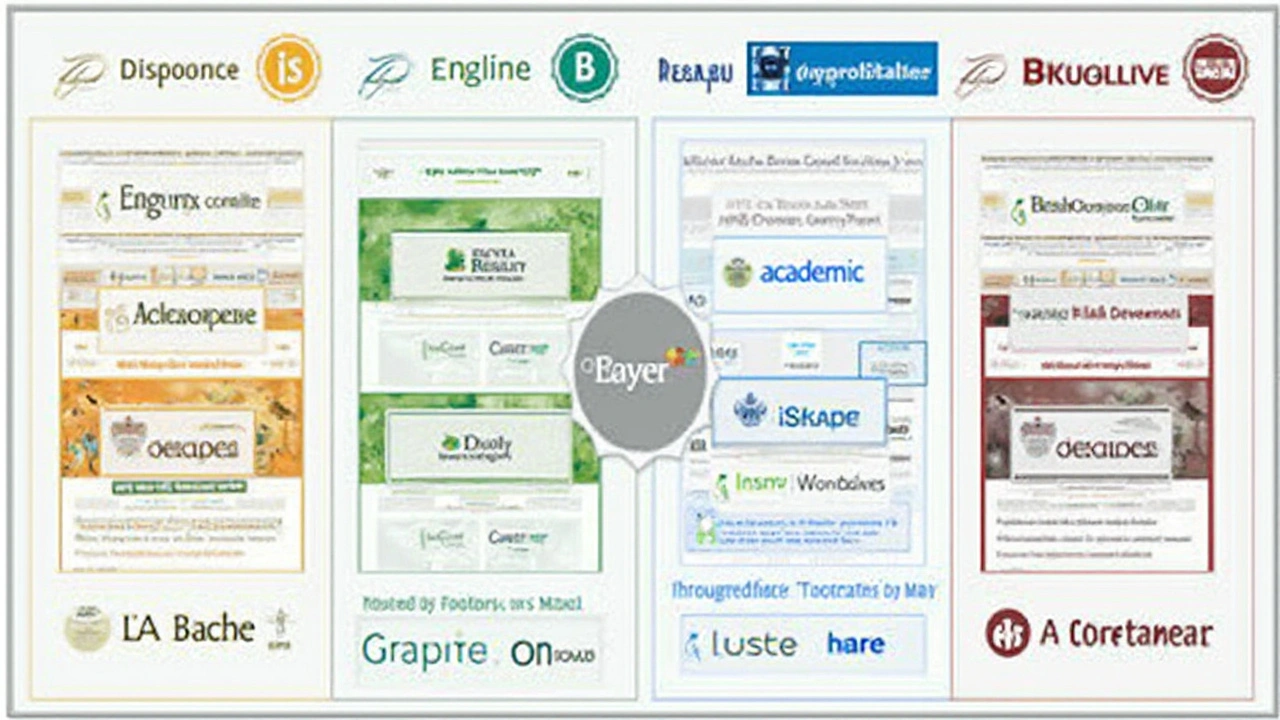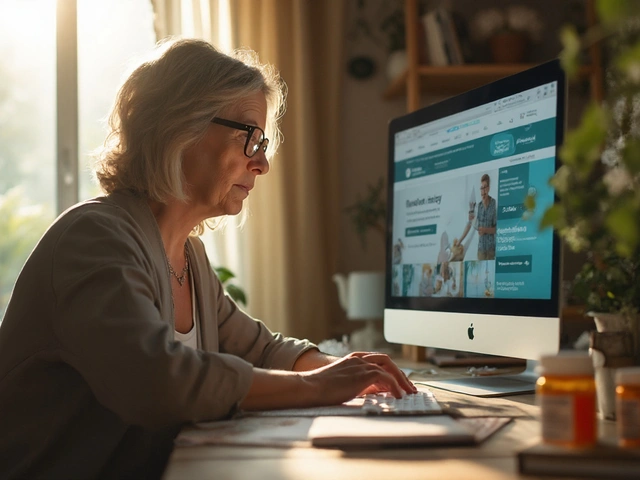Why It’s Time to Look Beyond WebMD
Everyone with an internet connection has probably Googled symptoms, and I’ll bet WebMD pops up almost every single time. But did you know WebMD isn’t a nonprofit? It’s a business—and that means ads, sponsored content, and sometimes a focus on clicks over clarity. What’s wild is that a lot of doctors, med students, and even university professors don’t rely on WebMD for the final word. They go for sites created by governments, universities, and trusted nonprofits. There’s good reason, too: studies show that a lot of online health information, especially from for-profit sites, can be incomplete, out of date, or just plain wrong. One research review found that only about 40% of online health and treatment recommendations actually match up with clinical guidelines. If you want facts backed by real science (not trends or social media hype), you need to know where the pros are looking. Ever wonder which sites doctors trust most? Platforms like MedlinePlus, Mayo Clinic, and the National Institutes of Health show up on the must-visit lists for medical professionals. You don’t have to have a fancy degree to use them—these sites break things down so anyone can understand, and they do it without trying to sell you vitamins along the way.
Let’s face it: nobody needs extra panic when you’re worried about your health. The right sites explain risks realistically, use plain English, and clearly stamp out fake news. But it’s not just about what they say; it’s how they’re run. Nonprofit and government platforms update information fast, based on actual peer-reviewed research. They have teams who chase down new studies, so you’re less likely to run into outdated fads or myths. As of May 2025, most academic health sites now post the source and review date right on top—super handy and reassuring when you’re sorting facts from fearmongering.
Not sure which sources make the cut? Here’s a quick tip: check who writes, reviews, and updates the medical info. Trusted sites always tell you the author and credentials (think MD, RN, or PhD). They’ll also warn you when something is just for general info—not a replacement for seeing your own doctor. Also, these platforms don’t have pop-ups offering miracle cures every five seconds. If you see that, it’s probably time to click away.
The Gold Standard: Nonprofit Health Resources
Let’s talk about the true heroes in the health info world: nonprofit medical websites. These are run by organizations that pour money back into research and education, not into shareholders’ pockets. They exist to keep the public informed and safe, and that shows in how they present information. If you’re asking, "Where do I find reliable health sites other than WebMD?"—these are where the real answers live.
- Mayo Clinic: This name comes up a lot in medical circles. Mayo Clinic’s website covers diseases, treatments, drugs, and wellness tips, with everything reviewed by their own doctors. It’s clearer and less sensationalized than most mainstream sites, plus they actually update the info frequently. If you want to check when a page was last updated, there’s usually a date at the bottom.
- Cleveland Clinic: This nonprofit has been around for over 100 years and isn’t here to scare you with wild stories. They offer honest, digestible guidance on everything from heart health to rare diseases. Their "Health Essentials" blog answers questions you might be too embarrassed to ask a doctor.
- KidsHealth from Nemours: Parents and kids can both use this site. Everything’s written in language kids and teens can get. There’s a section for parents, another for teens, and even a special part designed for younger children learning about health.
- American Cancer Society: If you need clear, up-to-date, and compassionate info about cancer, this is the site to trust. You’ll find explanations of treatments, research news, cancer types, and stories from people who have actually lived through what you’re facing.
- MedlinePlus (US National Library of Medicine): This is a heavy hitter, run by the world’s biggest medical library. It’s written for non-experts, skips the hype, and covers almost every health topic you could name. It even links to clinical trials and journal articles if you want details straight from the source.
What makes these sites stand out? For one, they double-check health articles with medical experts before posting anything. They tell you when there’s not enough research, so you don’t accidentally fall down an internet rabbit hole.
Surprisingly, stats show that 63% of Americans say they use health sites to self-diagnose. That’s a lot of people making decisions—sometimes big ones—based on what they find online, so it’s worth following the sources that double and triple check before hitting “publish.” Want even more alternatives? Check this curated list of reliable health sites other than WebMD. I’ve bookmarked it myself for those late-night "what-is-that-rash" panics.

Trusted Government Health Platforms: Your Tax Dollars at Work
Most people don’t realize how much gold is hiding on official government health websites. Yep, your taxes help fund these platforms, so you should absolutely take advantage of them. The content is usually checked by panels of doctors, researchers, and public health experts. No clickbait. No product pushing. Just facts.
Centers for Disease Control and Prevention (CDC): This one is a biggie. The CDC isn’t just about tracking viruses or flu outbreaks. Need advice on travel vaccines? Confused about food recalls? Want up-to-date data on heart disease or allergies? The CDC has specialty sections for all this and more. They update fast, which came in clutch during COVID and recent RSV surges.
National Institutes of Health (NIH): You’re not going to find beauty tips here, but if you want the science behind supplements, sleep, or disease risks, NIH is the place to look. Their Health Information A-Z index feels like Google for real medical research. Fascinating tidbit: NIH spends billions every year on health research, and the results trickle right onto their site. That means you’re seeing updates sometimes within weeks of a study publishing.
Food and Drug Administration (FDA): People mostly know the FDA for drug approvals, but they actually have huge amounts of info on medications, supplements, and food safety. They even have black box warnings and recall alerts if a medicine or food is suddenly found to be risky.
World Health Organization (WHO): WHO goes global. If you want to track emerging outbreaks, international travel health rules, or vaccine eligibility, this is ground zero. They clarify when a health worry is real or just media noise. During international events like bird flu or monkeypox spikes, you can count on WHO for updates before the news even hits your feed.
| Platform | Audience | Special Features |
|---|---|---|
| CDC | All ages | Travel, emergency outbreaks, healthy living tips |
| NIH | Teens to seniors | Latest research, disease facts, clinical trial info |
| FDA | Adults, parents | Drug & food recalls, safety warnings, approvals |
| WHO | Everyone | Global disease tracking, vaccine info, emergencies |
One nice thing about government sites is their accessibility. Most info is available in Spanish and other languages, making them super inclusive. They also avoid medical jargon so the info doesn’t fly over your head at 2 a.m. when you’re swiping in bed.
Tip: If you want to deep dive into treatments, the CDC and NIH often embed infographics or short videos. These visuals break down complicated concepts for anyone who learns better by seeing rather than just reading. The reliability of these platforms isn’t just because they’re official; it’s because their whole job is sharing what works, what doesn’t, and what’s still unknown.
Academic Medical Centers: When You Want the Latest Science, Not Guesswork
University-affiliated medical centers lead the charge when it comes to adapting fast to new treatments and discoveries. Why? These are the places where tomorrow’s protocols get tested and refined. Their websites double as patient education resources and references for med students—so they have to be accurate. Most of these sites publish in real time as new findings come out. No waiting years to update info like some print encyclopedias.
Johns Hopkins Medicine: If you care about the latest on brain disorders, COVID variants, or medication safety, Johns Hopkins’ Health Library is unmatched. All their material is vetted by board-certified doctors, and they love turning medical stats into easy-to-read charts. They also debunk myths and report on new studies, with citations.
Harvard Health Publishing: It’s Harvard, so they bring the receipts. Their medical school faculty write and review the site’s content, so you’re literally getting top-tier expertise tailored for the public. Their "Ask a Doctor" and "Harvard Health Blog" answer real-world questions that often show up in everyday life—like "why is my heart beating funny after a stressful day?"
Medscape and Merck Manuals: These are actually used by healthcare pros, but each has public-facing sections. Sometimes language can be technical, but there are "consumer" or "patient" tabs that translate medical speak into regular English. If you want to see what doctors read, peek at these during your next search.
Cleveland Clinic (again!): Because it’s both a nonprofit and an academic giant, you’ll often see Cleveland Clinic make lists for both types of reliable sites. Their "Conditions & Diseases" and "Symptoms" sections are especially practical for people chasing a trustworthy diagnosis or background before talking to their doctor.
How do you know an academic site’s legit? Double-check for the publishing date, author’s credentials, and any mention of their editorial board. If you see info like "last reviewed April 2025," that’s a good sign. Many academic sites also share references or links to medical journal studies, so you can geek out as deep as you want.
Bonus tip: a lot of these centers now offer patient handouts, downloadable PDFs, and webinars—meaning you can learn the same way med students do but without tuition bills or stress over finals. Next time someone gives you iffy medical advice at a party, you’ll have rock-solid science to back up your facts.




Ismaeel Ishaaq
July 17, 2025 AT 22:38Really glad this topic got posted! It’s about time we start looking beyond the usual suspects like WebMD for trustworthy health info. There’s so much noise online, it can be downright brutal sifting through it all.
I appreciate the shout out to nonprofit and government sources because those tend to have fewer biases and commercial interests. And hey, if those sites are actually used by real doctors, that says a lot about their credibility.
The article's promise to reveal who runs these sites? That’s crucial! Transparency is everything. No one should trust random health info without knowing the source’s background and agenda.
Looking forward to bookmarking these platforms and sharing them around. Reliable health info can literally save lives, so spreading the word matters. Anyone else have favorites they rely on apart from WebMD?
Jesse Goodman
July 19, 2025 AT 06:40This actually sounds quite useful and timely. I mean, health info online is a bit of a minefield, right? 🙃 It feels like everyone has an opinion, but not everyone has facts. So a list focusing on top government and academic sites might be a shortcut to the good stuff.
Love that it prioritizes facts over ads or trendiness. Because honestly, who needs another flashy website full of sponsored nonsense?
Can’t wait to see the surprising facts about who runs these sites too. That kind of behind-the-scenes info always piques my interest.
Does anyone know if these alternatives also cover mental health? That’s an area where good info is super needed.
Antara Kumar
July 20, 2025 AT 09:03Honestly, I don’t put much faith in all these fancy government and nonprofit sites. They come with their own agendas, just less obvious than commercial ones. People should be skeptical about any health info they find online.
Besides, most of these foreign sites might not even apply well to local health contexts, especially here in India. We need sources grounded in our realities, not some generic global info.
Still, I’d be interested to know what exactly these alternatives are. Maybe some of them actually have something useful beyond the usual clichés.
John Barton
July 21, 2025 AT 14:13Oh sure, because nothing screams "trustworthy" like a government website plastered with disclaimers and red tape. 🙄 Seriously though, the idea that doctors actually prefer WebMD alternatives sounds like a punchline.
People always want shiny, new, hip websites but forget that the internet is mostly a swamp of misinformation no matter who runs the site. Breaking down trusted sources is a noble goal, but I’m guessing the results are less glamorous than promised.
Still, I might bite and check out which platforms made the cut. Maybe they'll surprise me.
Achint Patel
July 22, 2025 AT 19:23It’s intriguing how this post highlights priorities beyond mere popularity or flashy design. Academic and government-run sites generally undergo rigorous review processes, which builds inherent trust.
That said, the general public's awareness of verifying online health resources leaves much to be desired. Encouraging more critical engagement like this article does is crucial.
Perhaps one takeaway is learning those little tips for spotting sound information—those skills are as important as the websites themselves.
Would love to see follow-up posts emphasizing digital health literacy alongside the resource list.
Lilly Merrill
July 24, 2025 AT 00:33I think it’s great that this article is dismantling the monopoly of WebMD and introducing us to alternatives. It can get so frustrating to wade through ads disguised as advice on so many platforms.
The focus on nonprofit and academic sources feels refreshing and necessary. They tend to approach content with more integrity.
Plus, knowing which sites doctors actually prefer provides some peace of mind that the info is clinically sound. I personally rely on NIH and Mayo Clinic way more than WebMD.
Curious if the article mentions any international trusted sites too for a more global perspective?
Charlie Martin
July 25, 2025 AT 02:56This feels like a really solid reminder on how important it is to keep questioning the sources we trust, especially when it comes to health. It's easy to just default to the first search result, but as this article points out, not all info is created equal.
I wonder about the balance these sites strike between accessibility for the layperson and medical accuracy. Sometimes the latter trumps usability, which turns people off.
Anyone know if these recommended sites have good tools or interactive features to help interpret medical info better?
Danielle Watson
July 26, 2025 AT 05:20This is such a relevant topic in today’s health climate. Tons of people rely on quick internet searches instead of visiting a doctor, so having trustworthy info is paramount.
Appreciate the article’s breakdown on spotting reliable info. Too often, folks stumble upon what seems like authoritative websites but are actually pushing agendas or products.
Besides the usual government and academic staples, I hope it includes pointers on how to cross-check info before accepting it as fact. That kind of digital literacy is so needed nowadays.
Does anyone have personal anecdotes where a trusted site helped them avoid misinformation?
Kimberly :)
August 1, 2025 AT 00:13Ugh, WebMD gets a bad rep but it does serve a purpose for a quick health check. That said, this list sounds like a goldmine for deeper, more factual research. 😎
Also curious about what the article means by “surprising facts about who runs these sites.” It makes me suspicious but in a good way — those little secrets make a difference.
For me, the best health info source is one that avoids scare tactics and delivers facts without spinning a story. Hope these alternatives fit that bill!
Sebastian Miles
August 6, 2025 AT 19:06This post smartly tackles an often overlooked issue: what databases or portals healthcare providers lean on for info. The public rarely considers this when they browse random health sites.
Many might be surprised by how much behind-the-scenes review and evidence-weighting goes into academic portals, making them gold standards for medical reliability.
That said, it’s vital that those platforms also be user-friendly and digestible for non-specialists. Evidence-based doesn’t have to mean inaccessible jargon.
Would love to see a companion guide mapping each site to its audience type, so people can pick what fits them best.
Harshal Sanghavi
August 10, 2025 AT 06:26Great to see an article giving love to worthy alternatives instead of blindly worshipping WebMD, which has its flaws and blindspots. Being a bit sardonic though, it’s funny how some people treat medical advice online like gospel, lol.
Still, the focus on reliable nonprofit and government sites for health info is a good reminder to stay grounded. These entities generally maintain more scientific rigor and less commercial influence.
Would be brilliant if the article also touched on how to verify updates and corrections on health websites, since medical info evolves fast these days.